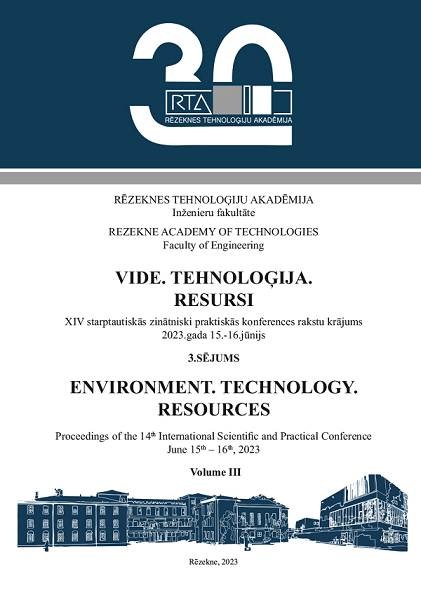APPROACH TO THE FORMING OF RATIONAL TECHNOLOGY FOR THE EXPORT CARGOES DELIVERY IN SUPPLY CHAIN ON THE PRINCIPLES OF CO-MODALITY
DOI:
https://doi.org/10.17770/etr2023vol3.7301Keywords:
Co-modality, export cargoes, supply chain, sustainability of transportationAbstract
In this article, we propose an approach to the forming of rational technology for the export cargoes delivery in the supply chain on the principles of co-modality in the context of effective interaction of delivery participants, which allows reducing the costs of all them through the optimal use of resources related to delivery and increasing the competitive advantages of products. Taking into account the strengthening of cooperation between road and rail transport, under modern conditions, combined transport within the international transport corridor is proposed as an alternative option to promote cargo flow in the supply chain. As a result of experimental studies carried out on the basis of the simulation model of the delivery process in the Petri Nets, the time characteristics of technological processes under alternative schemes depending on the input parameters of the model have been determined. A comparative assessment of alternative delivery schemes based on mathematical models has made it possible to establish that the rational scheme for the delivery of export cargo from Ukraine to Germany via the Pan-European Corridor III is the Rolling Highway technology, which ensures compliance with the cargo owner's requirements for delivery time and cost established by the contract. The proposed approach is recommended as a tool for making managerial decisions when planning and organising the delivery of export cargoes from Ukraine to the EU countries in order to effectively manage supply chains by minimising the cost of delivery and environmental damage.
References
V. Naumov, O. Shulika, O. Orda, H. Vasiutina, M. Bauer, and M. Oliskevych, “Shaping the Optimal Technology for Servicing the Long-Distance Deliveries of Packaged Cargo by Road Transport,” Sustainability, vol. 14, no. 12, p. 7283, Jun. 2022, https://doi.org/10.3390/su14127283. [Online]. Available: https://www.mdpi.com/2071-1050/14/12/7283 [Accessed Oct. 14, 2022].
O. Orda, “Formation of strategies of the organization of intermodal container transportations in supply chains on the principles of cooperation of participants,” M.S. thesis, Kharkiv National Automobile and Highway University, Kharkiv, Ukraine, 2019.
Ukrainian Shipping Magazine, “Informall BG: Resumption of direct container transportation to Ukraine is a humanitarian need,” Ukrainian Shipping Magazine, 2022. [Online]. Available: https://en.usm.media/. [Accessed Jan. 15, 2023].
O. Pavlenko, N. Shramenko, and D. Muzylyov, “Logistics Optimization of Agricultural Products Supply to the European Union Based on Modeling by Petri Nets,” In Proc. NT 2020 International Conference New Technologies, Development and Applications ’128, 2020, pp. 596–604.
Publications Office of the European Union, “White paper on transport. Roadmap to a single European transport area : towards a competitive and resource efficient transport system,” Publications Office of the European Union, 2011. [Online]. Available: https://op.europa.eu/en/publication-detail/-/publication/bfaa7afd-7d56-4a8d-b44d-2d1630448855/language-en. [Accessed: Oct. 12, 2022].
[O. Datsii, N. Levchenko, G. Shyshkanova, O. Platonov, and V. Zalizniuk, “State policy for the development of multimodal transportation by clean and energy efficient motor transport,” Cuestiones Políticas, vol. 39, no. 71, pp. 884-902, 2021, https://doi.org/10.46398/cuestpol.3971.54. [Online]. Available: https://produccioncientificaluz.org/index.php/cuestiones/article/download/37493/41009/ [Accessed Oct. 12, 2022].
A. Chandra, A. Pani, P.K. Sahu and S. Sushant, “Integrating Commodity-Based and Trip-Based Approaches of Freight Demand Modelling Using Trip Length Distributions,”. Journal of The Institution of Engineers (India): Series A, vol. 104, no. 1, March 2023. [Abstract]. Available: Springer, https://link.springer.com/article/10.1007/s40030-023-00712-1#citeas. [Accessed February 20, 2023].
N. Ronald, J. Yang, and R. G. Thompson, “Exploring Co-Modality Using On-Demand Transport Systems,” The 9th International Conference on City Logistics, June 17-19, 2015, Tenerife, Canary Islands (Spain). Transportation Research Procedia vol. 12, 2016, pp. 203-212. [Online]. Available: https://www.sciencedirect.com/science/article/pii/S2352146516000600 [Accessed Jan. 15, 2023].
Ye. Nagornyy, V. Naumov, and A. Ivanchenko, “The model of logistics system of cargo delivery in international traffic,” Automobile Transport, vol. 29, pp. 120-124, 2011.
N. Shramenko, “Rationalization of interaction between terminal complexes and cargo owners,” Scientific Journal Transactions of Kremenchuk Mykhailo Ostrohradskyi National University, vol. 2 (79), pp. 109–113, 2013.
V. Badyal, W. G. Ferrell Jr, N. Huynh and B. Padmanabhan, “A two-stage stochastic model for intermodal terminal location and freight distribution under facility disruptions,” International Journal of Systems Science: Operations & Logistics, vol. 10, no. 1, p. 2169055, January 2023. [Abstract]. Available: Taylor & Francis Online, https://www.tandfonline.com/doi/full/10.1080/23302674.2023.2169055?scroll=top&needAccess=true&role=tab. [Accessed February 26, 2023].
V. Naumov, I. Taran, Y. Litvinova, and M. Bauer, “Optimizing Resources of Multimodal Transport Terminal for Material Flow Service,” Sustainability, vol. 12, no. 16, p. 6545, Aug. 2020, https://doi.org/10.3390/su12166545. [Online]. Available: https://www.mdpi.com/2071-1050/12/16/6545 [Accessed Nov. 13, 2022].
O. Pavlenko, D. Velykodnyi, O. Lavrentieva, and S. Filatov, “The Procedures of Logistic Transport Systems Simulation in the Petri Nets Environment,” In Proc. ICTERI 2020 16th International Conference on ICT in Education, Research and Industrial Applications. Integration, Harmonization and Knowledge Transfer. Volume II: Workshops ’2732, 2020, pp. 854-868.
S. Okyere, J. Yang, and C. A. Adams, “Optimizing the Sustainable Multimodal Freight Transport and Logistics System Based on the Genetic Algorithm,” Sustainability, vol. 14, no. 18, p. 11577, Sep. 2022, https://doi.org/10.3390/su141811577. [Online]. Available: http://dx.doi.org/10.3390/su141811577 [Accessed Dec. 20, 2022]
Ye. Nagornyy and N. Shramenko, Commercial work on road transport. Kharkiv: Kharkiv National Automobile and Highway University Press, 2010.



